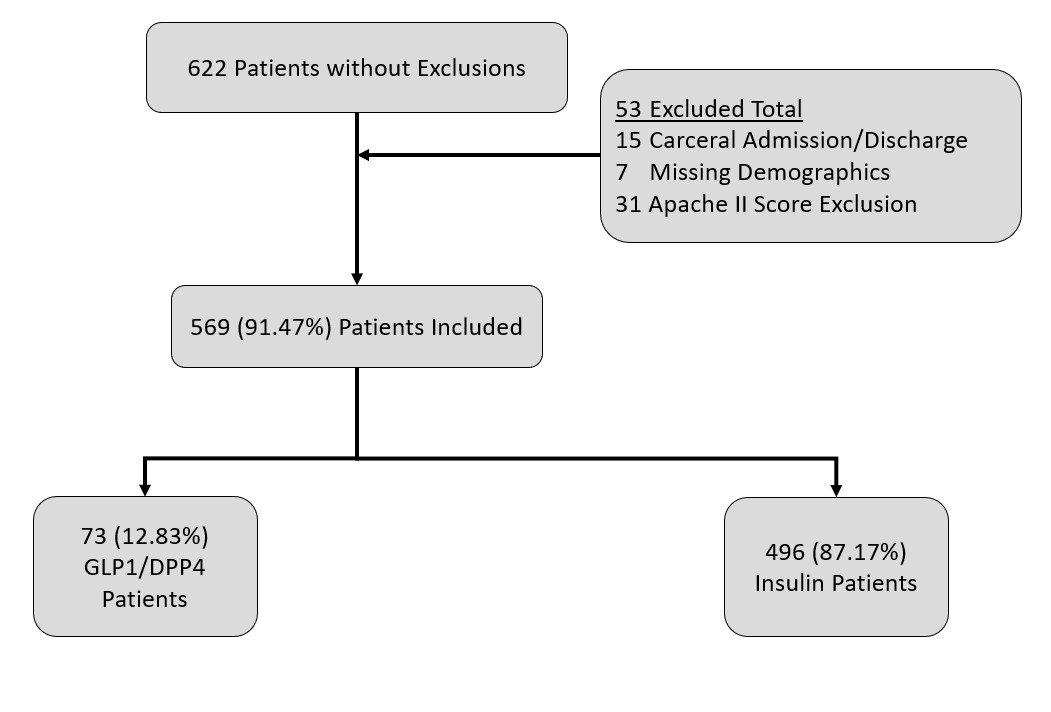Monday Poster Session
Category: Biliary/Pancreas
P2168 - Evaluating the Severity of Acute Pancreatitis in Type 2 Diabetes Patients Treated With Incretin-Based Therapies versus Insulin: A Multicenter Retrospective Analysis Using APACHE II
Monday, October 27, 2025
10:30 AM - 4:00 PM PDT
Location: Exhibit Hall

Priya Kumari Maheshwari, MD (she/her/hers)
University of Central Florida, HCA Healthcare GME
Pensacola, FL
Presenting Author(s)
Priya Kumari Maheshwari, MD1, Mayank Rampal, MD2, Brendon Cornett, MPH3, Ali Tariq, MD4, Anil Harrison, MD5
1University of Central Florida, HCA Healthcare GME, Pensacola, FL; 2UCF/HCA Florida West Hospital, Pensacola, FL; 3HCA Healthcare, Brighton, CO; 4HCA FLORIDA WEST HOSPITAL, Pensacola, FL; 5Midwestern University, Glendale, AZ
Introduction: Incretin-based therapies, such as GLP-1 receptor agonists and DPP-IV inhibitors, are commonly prescribed for type 2 diabetes mellitus (T2DM), but concerns about their potential link to acute pancreatitis (AP) persist. While several large-scale studies have assessed AP risk, few have examined its severity. Validated scoring systems such as APACHE II are rarely used to assess illness severity in this context, in published studies of AP associated with incretin therapy. We evaluated AP severity in hospitalized T2DM patients treated with GLP-1/DPP-IV inhibitors versus insulin using real-world multicenter data.
Methods: We conducted a multicenter retrospective review of adult T2DM patients hospitalized with AP across HCA Healthcare facilities (2005–2024). AP was identified using ICD coding and confirmatory clinical documentation (e.g., imaging, enzyme levels), when available. Patients were grouped by home diabetes treatment: GLP-1/DPP-IV inhibitors or insulin. The primary outcome was AP severity (admission APACHE II scores); secondary outcomes included in-hospital mortality and discharge disposition. Multivariable linear and logistic regression models adjusted for Elixhauser Comorbidity Index (ECI) and BMI.
Results: Out of 622 patients screened, 569 met inclusion criteria (GLP-1/DPP-IV: n=73; insulin: n=496) (Figure 1). GLP-1/DPP-IV patients were older (65.5 vs. 55.7 years) and had lower BMI (30.4 vs. 33.6). APACHE II scores were higher in this group (12.4 vs. 11.3), though the difference approached but did not reach statistical significance (β = 0.80; 95% CI: –0.06 to 1.66; p = 0.07) (Table 1). In-hospital mortality was low and comparable (1.37% vs. 1.81%; OR = 0.57; 95% CI: 0.07–4.68; p = 0.60), though the low event rate may limit interpretation. Higher ECI scores were independently associated with increased severity and mortality (p < 0.05) (Table 2). The small sample size in the GLP-1/DPP-IV group may have limited detection of subtle differences.
Discussion: In this real-world cohort, GLP-1/DPP-IV therapy was not associated with significantly worse AP severity or in-hospital mortality compared to insulin. While a non-significant trend toward higher severity was observed in the GLP-1/DPP-IV group, further investigation into larger studies is warranted. Incretin-based therapies were not associated with significantly worse pancreatitis severity or mortality compared to insulin, supporting their continued use in T2DM patients while highlighting the impact of comorbidities on outcomes.

Figure: Figure 1: Flowchart of patient selection and cohort allocation

Figure: Table 1: Linear regression analysis evaluating the association between treatment group (GLP-1 vs. insulin) and APACHE II score, adjusted for BMI and Elixhauser Comorbidity Index; Table 2: Logistic regression analysis was conducted to assess the association between treatment group (GLP-1 vs. insulin) and in-hospital mortality, adjusting for BMI and Elixhauser Comorbidity Index
Disclosures:
Priya Kumari Maheshwari indicated no relevant financial relationships.
Mayank Rampal indicated no relevant financial relationships.
Brendon Cornett indicated no relevant financial relationships.
Ali Tariq indicated no relevant financial relationships.
Anil Harrison indicated no relevant financial relationships.
Priya Kumari Maheshwari, MD1, Mayank Rampal, MD2, Brendon Cornett, MPH3, Ali Tariq, MD4, Anil Harrison, MD5. P2168 - Evaluating the Severity of Acute Pancreatitis in Type 2 Diabetes Patients Treated With Incretin-Based Therapies versus Insulin: A Multicenter Retrospective Analysis Using APACHE II, ACG 2025 Annual Scientific Meeting Abstracts. Phoenix, AZ: American College of Gastroenterology.
1University of Central Florida, HCA Healthcare GME, Pensacola, FL; 2UCF/HCA Florida West Hospital, Pensacola, FL; 3HCA Healthcare, Brighton, CO; 4HCA FLORIDA WEST HOSPITAL, Pensacola, FL; 5Midwestern University, Glendale, AZ
Introduction: Incretin-based therapies, such as GLP-1 receptor agonists and DPP-IV inhibitors, are commonly prescribed for type 2 diabetes mellitus (T2DM), but concerns about their potential link to acute pancreatitis (AP) persist. While several large-scale studies have assessed AP risk, few have examined its severity. Validated scoring systems such as APACHE II are rarely used to assess illness severity in this context, in published studies of AP associated with incretin therapy. We evaluated AP severity in hospitalized T2DM patients treated with GLP-1/DPP-IV inhibitors versus insulin using real-world multicenter data.
Methods: We conducted a multicenter retrospective review of adult T2DM patients hospitalized with AP across HCA Healthcare facilities (2005–2024). AP was identified using ICD coding and confirmatory clinical documentation (e.g., imaging, enzyme levels), when available. Patients were grouped by home diabetes treatment: GLP-1/DPP-IV inhibitors or insulin. The primary outcome was AP severity (admission APACHE II scores); secondary outcomes included in-hospital mortality and discharge disposition. Multivariable linear and logistic regression models adjusted for Elixhauser Comorbidity Index (ECI) and BMI.
Results: Out of 622 patients screened, 569 met inclusion criteria (GLP-1/DPP-IV: n=73; insulin: n=496) (Figure 1). GLP-1/DPP-IV patients were older (65.5 vs. 55.7 years) and had lower BMI (30.4 vs. 33.6). APACHE II scores were higher in this group (12.4 vs. 11.3), though the difference approached but did not reach statistical significance (β = 0.80; 95% CI: –0.06 to 1.66; p = 0.07) (Table 1). In-hospital mortality was low and comparable (1.37% vs. 1.81%; OR = 0.57; 95% CI: 0.07–4.68; p = 0.60), though the low event rate may limit interpretation. Higher ECI scores were independently associated with increased severity and mortality (p < 0.05) (Table 2). The small sample size in the GLP-1/DPP-IV group may have limited detection of subtle differences.
Discussion: In this real-world cohort, GLP-1/DPP-IV therapy was not associated with significantly worse AP severity or in-hospital mortality compared to insulin. While a non-significant trend toward higher severity was observed in the GLP-1/DPP-IV group, further investigation into larger studies is warranted. Incretin-based therapies were not associated with significantly worse pancreatitis severity or mortality compared to insulin, supporting their continued use in T2DM patients while highlighting the impact of comorbidities on outcomes.

Figure: Figure 1: Flowchart of patient selection and cohort allocation

Figure: Table 1: Linear regression analysis evaluating the association between treatment group (GLP-1 vs. insulin) and APACHE II score, adjusted for BMI and Elixhauser Comorbidity Index; Table 2: Logistic regression analysis was conducted to assess the association between treatment group (GLP-1 vs. insulin) and in-hospital mortality, adjusting for BMI and Elixhauser Comorbidity Index
Disclosures:
Priya Kumari Maheshwari indicated no relevant financial relationships.
Mayank Rampal indicated no relevant financial relationships.
Brendon Cornett indicated no relevant financial relationships.
Ali Tariq indicated no relevant financial relationships.
Anil Harrison indicated no relevant financial relationships.
Priya Kumari Maheshwari, MD1, Mayank Rampal, MD2, Brendon Cornett, MPH3, Ali Tariq, MD4, Anil Harrison, MD5. P2168 - Evaluating the Severity of Acute Pancreatitis in Type 2 Diabetes Patients Treated With Incretin-Based Therapies versus Insulin: A Multicenter Retrospective Analysis Using APACHE II, ACG 2025 Annual Scientific Meeting Abstracts. Phoenix, AZ: American College of Gastroenterology.

